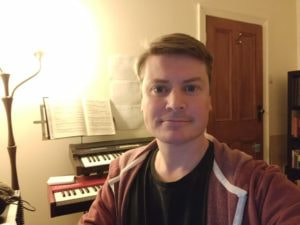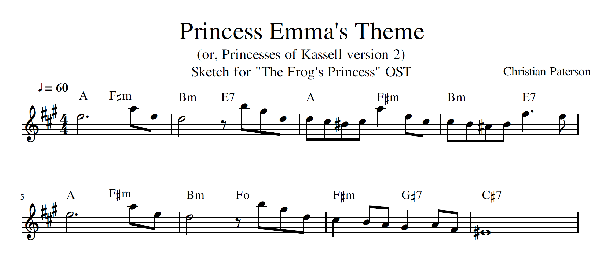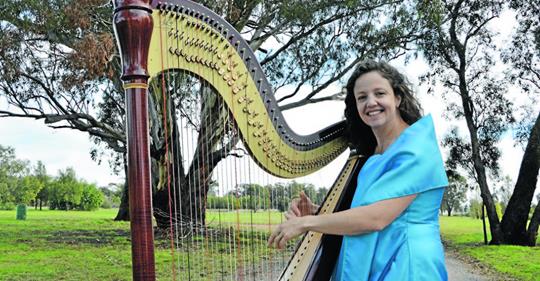Christian Paterson
Christian Paterson
Bachelor of Music Studies
Bachelor of Music Studies
Frog's Princess would not have a heart without Christian Paterson's beautiful, emotional music.
Christian found out everything he could about the story and the characters before he started composing for Frog's Princess.
These short videos showcase Christian Paterson's 10 beautiful themes.
They were recorded when the game was unfinished. We are making new videos.
These short videos showcase Christian Paterson's 10 beautiful themes.
They were recorded when the game was unfinished. We are making new videos.
Prince Francis's theme
|
The very first music Christian created for Frog's Princess was Francis's theme. Francis' theme is gay and royal, a call to arms.
When the dramatic brash brass movement plays, we know Francis is up to something (once again). |
|
Princess Emma's theme
|
Nothing could be more lovely than this haunting melody expressing the pathos of a lonely girl unsure of how to combat the evil surrounding her.
|
|
The Frog Prince theme
|
Frog's theme is cute and funny and boppy, showing what an irrepressible frog he is, and also deep like a frog, but still has Christian's trademark melodic nature.
Christian said he was imagining a moment of flighty but comical panicked realisation when he composed it: "OMG, I'm a frog!" |
|
Theme for Lorelei
|
Lady Lorelei is a shapeshifter who cares only about gaining power to disguise her lowly origins. People mean nothing at all to her except as beings who can provide adulation.
Christian saw Lady Lorelei as is proud, vain, imperious, and evil, although Kathy would say she was greedy rather than truly evil. Christian said composing Lady Lorelei's theme was like pulling teeth, but he eventually created a wonderful building feeling of power and wickedness. |
|
Iron Henry's theme
|
|
Iron Henry only believes in one thing: cold, hard iron. He stoically sacrifices himself to protect his prince.
Christian created this epic music to show the weight of Iron Henry's duty. He included some references to religious music to evoke a mythic, almost Arthurian type quality. |
|
Spooky Woods Music
|
The spooky woods music has an exciting rhythm with a sound building to a roar. Christian can make even a harp-style trill of notes sound eerie!
|
|
Going to Battle music
|
The insistent drum beat emphasises the building tension as Emma tries to prevent the looming battle, and the choir effect adds to the importance of the moment.
|
|
|
The King of Kassel's theme
|
The King of Kassel, under the bewitchment of Lady Lorelei, does not recognise the frog as a prince.
Christian's main inspiration was military marches as he wanted to indicate officiousness, pomposity and bluster. He included a solo oboe melody as he felt it lent a brittleness and kind of acerbic tone. He wanted it to retain an undertone of nobility but indicate a more problematic personality. So while he used a more expansive melody that ascends in leaps in a major key at first, a swift change to a minor key is intended to represent the King's contrarian stubbornness. He kept the music bright and fast paced in keeping with a character with a loud, brash, bossy personality. Due to the short length, he changed key often and rapidly, and it is also in keeping with a capricious and unpredictable ruler, keeping everyone on their toes! |
|
Ramona's theme
|
Ramona helps her father administer the kingdom and takes her duties seriously.
She believes she needs to read and study to understand everything. She doesn't believe Francis is a prince because such a thing is outside her experience. Christian saw Ramona as an elegant, serious young lady. He captured her serious disposition using a minor key without being doleful, and used clean precise piano notes to convey her intellectual personality, with strings to match it to the rest of the score. |
|
Hilda's theme
|
Princess Hilda is the bold, brash, beautiful second sister. Christian said he had a really strong image of her as a kind of headstrong, impulsive and brave heroic figure, skilled at riding and hunting and woodsmanship.
So the main woodwind melody and then repeated in the strings is for her spirited nature. The pompous brass represents the military activities and then there is a touch of peril and heroism with the contacting section in trumpets and trombone, but ending on a major key to show that it's about the heroism not the danger - she enjoys it. Then the clarinet solo is to give a rustic and homely quality - her woodcraft and the simple wholesome pleasures of a healthy outdoor life - and then a final tutti to bring it together with a bit of brash percussion - it's her gusto and lust for life. |
|
We are grateful and amazed at how Christian divined the depth and beauty of the Frog's Prince story and expressed it in music.
Here is Christian describing in his own words what it was like to compose and perform for Frog's Princess.
See other examples of Christian's work at www.hapticfabrications.com
Beethoven's Hymn To Joy produced by Wojciech Panufnik
Not realising it hasn't been composed yet, the citizens of Olden sing Beethoven's Hymn to Joy from the final movement of his Ninth Symphony as the camera soars up into the skies where we have a final lovely surprise. You have to play the game to see it! This very fast rendition was created by Wojciech Panufnik and bought through Sound Image, Poland.
|
Music bought from SoundImage http://www.soundimage.pl/royalty-free-music/track-27021.html
|
|
Harp music by Leah O'Rourke
|
Leah composes, performs and teaches harp and piano music in South Australia. She provided Brahm's Lullaby.
Brahms' Lullaby is by (surprise!) German composer Johannes Brahms. Officially it is numbered Opus 49, Number 4. It was published in 1868, nearly 800 years after Emma played it, showing just how much of a prodigy Emma was. |
Leah O'Rourke, B. Music
https://www.facebook.com/pg/LeahOrourkeMusic/ Email Leah@Orourke.net.au |
|
Emma plays the harp in the Great Hall in the sisters' joint effort to stall their father. Villagers hush their children as Emma starts to play.
|
|



